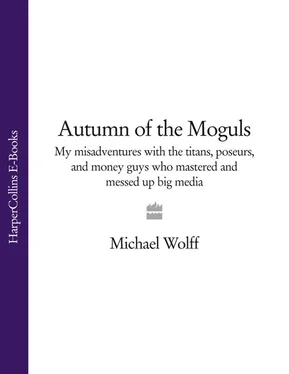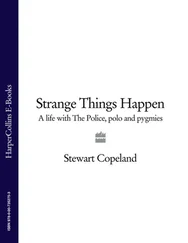Autumn of the Moguls
My Misadventures with the Titans, Poseurs, and Money Guys Who Mastered and Messed Up Big Media
Michael Wolff
HARPER PERENNIAL
for Alison
Cover
Title Page Autumn of the Moguls My Misadventures with the Titans, Poseurs, and Money Guys Who Mastered and Messed Up Big Media Michael Wolff HARPER PERENNIAL
Prologue
Book ONE: Spring and Summer 2002
1THE COMEDY
2MY TABLE
3LUNCH
4THE POWERS THAT BE
5THE PARTNER
6MY THEORY
7THE BALLAD OF JEAN-MARIE
8IN THE SAME BOAT
9BOB PITTMAN—A DIGRESSION
10NOT GETTING IT
11BARRY BUFFETT
12AND THEN THERE WAS MURDOCH
Book TWO: Autumn
1THE LIFE OF THE PARTY
2AILES AND TRUMAN
3MY DINNER WITH RUPERT
4THE REHEARSAL
5THE OTHER PANEL
6THE FIRST DAY
7THE MISSING (MEL AND SUMNER)
8CHARLIE AND MICHAEL
9MORE MICHAELS
10KEN AND STEVE
11MORE MICHAELS AND MORE DINNER
12KURT AND HARVEY
13TERRY, PETER, AND JEFF
14THE MAN UP THERE
15UNREAL PROPERTY
16THE BIG EVENING
17THE GUEST LIST
18  Martha
Martha
19TINA
20AND STILL MORE COCKTAILS
21PINCH
22THE FINAL DINNER
23BARRY TRIUMPHANT—SORT OF
24WALTER
EPILOGUE: WINTER AND SPRING
INDEX
Notes And Acknowledgments
About the Author
By the same author
P. S. Ideas interviews & features …
Copyright
About the Publisher
A flashback, already
On the tenth day of the new millennium, Bruce Judson, a former Time Inc.-er, left a long message on my machine. Judson, who had formerly been an assistant to various high-ranking Time Inc. ministers, was making a joke, which I only half listened to, about some meeting we had been at together.
Judson and I—with Time managing editor and future CNN chairman Walter Isaacson—had sat on a committee at Time Warner that had decided to recommend that the company not buy AOL in 1994. But why was Judson talking about this now? I wondered as I got into the shower.
It was only in very slow motion that Judson’s message started to seem coherent in a more or less breathtaking way.
Indeed, it is almost impossible to convey now, from several years’ remove (even knowing the ultimate outcome), the unlikeliness, the utter disconnect, the lunacy of the entire far-fetched scenario: that AOL would buy Time Warner, that Time Warner would let itself be bought.
Nothing, perhaps, in business history, had ever been this … farfetched.
Jumping from the shower, dripping wet, grabbing for a towel, I flipped on CNN.
A moment later, I got a call from Caroline Miller, the editor in chief of New York magazine, where I wrote a weekly column about the media business. She seemed both aghast and excited at the same time.
“What do you want to do?” Caroline asked, balancing the mundane and the momentous.
In fact, holding my towel, I was not at all sure what to do. I felt small and inconsequential.
“I don’t know,” I said. “I guess I better get over there.”
As I might run out to cover a fire, I threw on some clothes and caught a cab over to the news conference where they were getting ready to announce the merger.
What was the proper affect here? Were we supposed to regard this as just a business story? Market reach, share price, boardroom stuff, instead of alignments, power shifts, and virtual geopolitical moves? The auditorium was filling up with business, media, and technology reporters, which for a second seemed surprising—why were they here? Where were the reporters from the national desk? The foreign desk, even? (Is this just my bias, not thinking of business reporters as real reporters? And technology reporters as an even lower order?) We’re going to miss the meaning of this story , I started to think, because the right desk doesn’t exist. Perhaps there should be a corporate-state desk. In that light, the AOL—Time Warner merger might be up there at some Munich Pact—Suez Canal—League of Nations level, or an entirely new kind of corporate-historical concept.
Something else: Reporters at other kinds of events—political events, disasters, crime scenes—are always nosing about, kibitzing, asking each other what they’ve got, but at this event, everyone just sat down and waited to be told what was what.
For a black-helicopter moment, a power move so amazingly tectonic that history would be written from here, this joint press conference was pretty bland.
The long lenses and porta-video packs were down in front of the auditorium when Time Warner CEO Jerry Levin, looking professorial and rumpled in what would be much-analyzed chinos and open shirt, came onto the stage, followed by AOL chairman Steve Case, in J.C. Penney-ish gray suit, then CNN’s Ted Turner, then the new co-COOs Bob Pittman (from AOL) and Dick Parsons (from Time Warner), and then Mike Kelly, AOL’s CFO. Everybody but Case sat down on the Dating Game— like chairs. Case opened, forcefully. But did this mean that he was the big cheese or just that he was introducing Levin? Levin indeed turned out to be the real presenter. He gave the details, such as they were, of the deal, and the philosophy, such as it was, and sent the clearest signals, to the extent that any were clear, about what was actually happening here.
It was not a businesslike presentation at all—none of the overload of information that is customary at merger announcements, the charts and bullet-pointed handouts—but, befitting a moment of at least as much political as commercial significance, a wholly symbolic tableau, although all the symbols were carefully veiled.
To do justice to the many conflicting and various unuttered messages that were being sent here, it was, I thought, probably best to look at this the way we used to look at the lineups and hierarchies and seating positions on May Day in Red Square. But the press, much of which was now owned by the merged company and therefore suddenly (as long as I am in this metaphor) something like the Soviet press, took the most literal of views.
In this view, all mergers are good mergers. Or, if not, they are superseded by even larger mergers. Mergers, in other words, are inevitable—and therefore, in some sense, unchallengeable.
Indeed, just a few months before, in what was then the biggest media merger, CBS had combined with Viacom. (The CBS and Viacom merger and now the AOL and Time Warner merger received more column inches of coverage than any other mergers before them—not least of all, of course, because they were about the media itself.)
Win-win was the most popular instant analysis. I wonder if we were this brain-dead just because we were so caught off guard, or because we or our colleagues had, instantly, made so much money off the deal (nearly 2,000 Time employees made, at the moment of the merger, $1 million or more, estimated the New York Post) that it was hard to think through the euphoria or jealousy, or because, as business reporters, the whole point is just to analyze with respect to up-and-down and not with an eye toward character, or consequence, or forest-for-the-trees.
Читать дальше

 Martha
Martha










